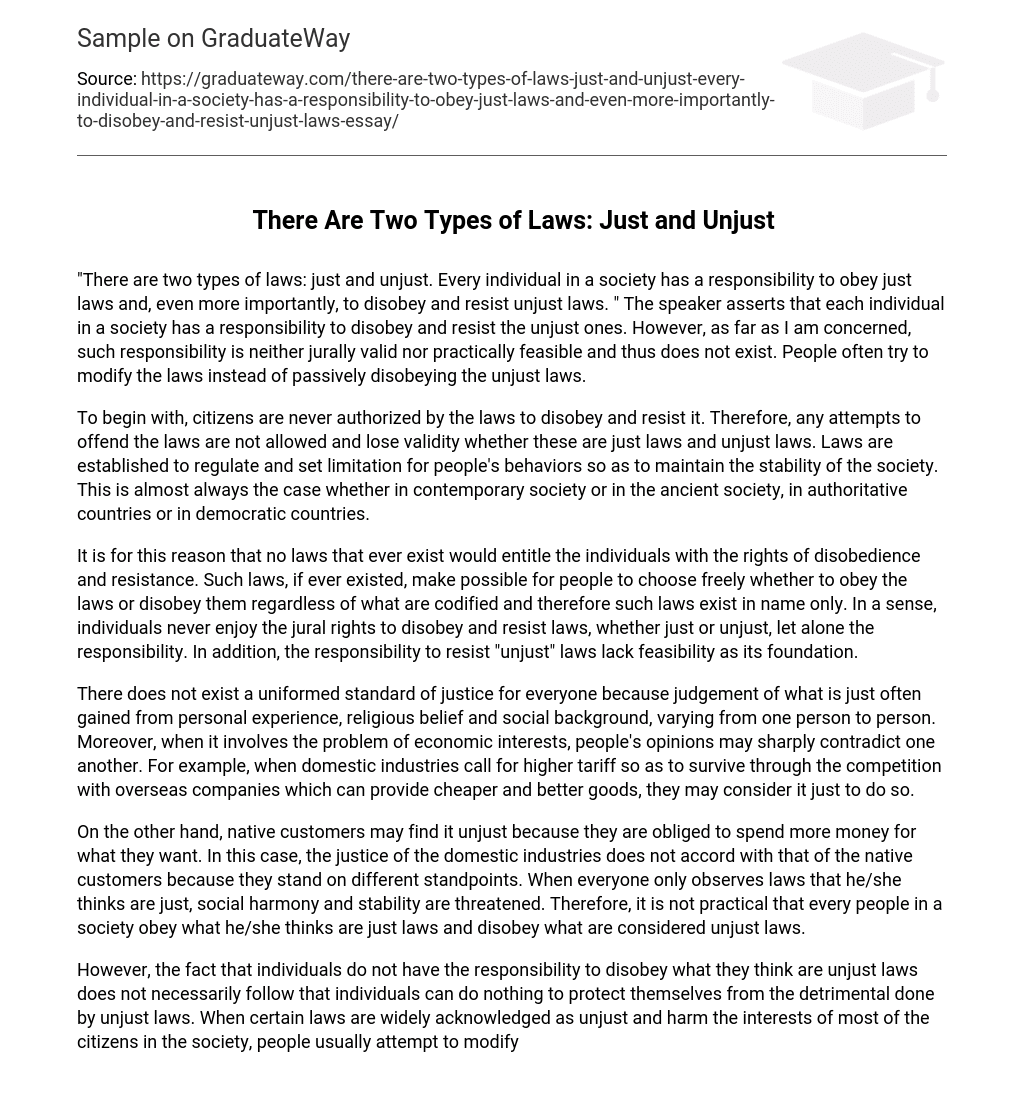“There are two types of laws: just and unjust. Every individual in a society has a responsibility to obey just laws and, even more importantly, to disobey and resist unjust laws. ” The speaker asserts that each individual in a society has a responsibility to disobey and resist the unjust ones. However, as far as I am concerned, such responsibility is neither jurally valid nor practically feasible and thus does not exist. People often try to modify the laws instead of passively disobeying the unjust laws.
To begin with, citizens are never authorized by the laws to disobey and resist it. Therefore, any attempts to offend the laws are not allowed and lose validity whether these are just laws and unjust laws. Laws are established to regulate and set limitation for people’s behaviors so as to maintain the stability of the society. This is almost always the case whether in contemporary society or in the ancient society, in authoritative countries or in democratic countries.
It is for this reason that no laws that ever exist would entitle the individuals with the rights of disobedience and resistance. Such laws, if ever existed, make possible for people to choose freely whether to obey the laws or disobey them regardless of what are codified and therefore such laws exist in name only. In a sense, individuals never enjoy the jural rights to disobey and resist laws, whether just or unjust, let alone the responsibility. In addition, the responsibility to resist “unjust” laws lack feasibility as its foundation.
There does not exist a uniformed standard of justice for everyone because judgement of what is just often gained from personal experience, religious belief and social background, varying from one person to person. Moreover, when it involves the problem of economic interests, people’s opinions may sharply contradict one another. For example, when domestic industries call for higher tariff so as to survive through the competition with overseas companies which can provide cheaper and better goods, they may consider it just to do so.
On the other hand, native customers may find it unjust because they are obliged to spend more money for what they want. In this case, the justice of the domestic industries does not accord with that of the native customers because they stand on different standpoints. When everyone only observes laws that he/she thinks are just, social harmony and stability are threatened. Therefore, it is not practical that every people in a society obey what he/she thinks are just laws and disobey what are considered unjust laws.
However, the fact that individuals do not have the responsibility to disobey what they think are unjust laws does not necessarily follow that individuals can do nothing to protect themselves from the detrimental done by unjust laws. When certain laws are widely acknowledged as unjust and harm the interests of most of the citizens in the society, people usually attempt to modify these laws. In democratic society, people have legal assess to express their wills through demonstration and realize such wills through election.
In authoritative countries, however, ordinary people usually do not have the legal approach to modify the unjust laws. If the governors fail to perceive their people’s wills, a revolution may break out to overturn the current regime and abolish the unjust laws. In a sense, instead of mere obedience and resistance to the unjust laws, people have more initiative and effective approaches to deal with them. To conclude, individuals do not have the responsibility to disobey the unjust laws and resist it. However, they can do something to change the laws themselves and solve the problem radically.





